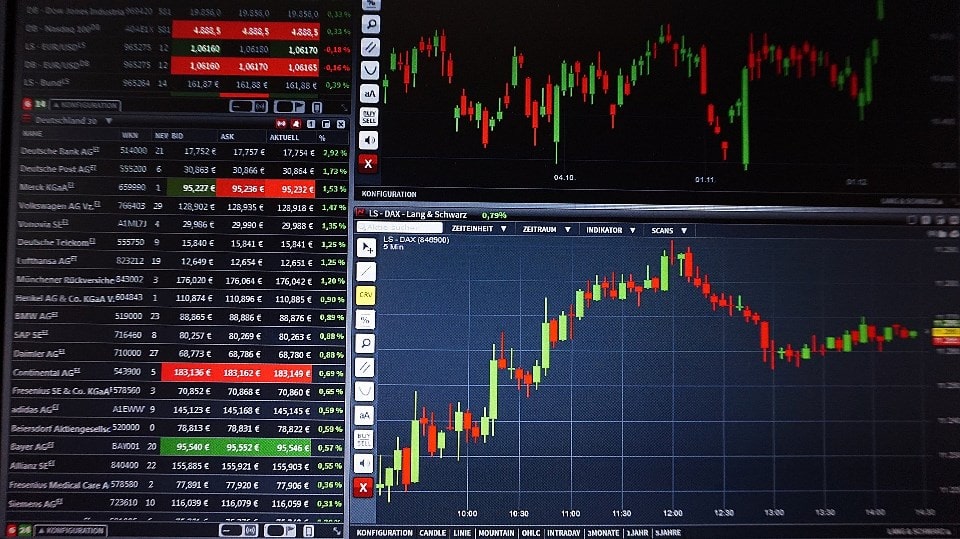Handy Reasons On Picking Forex Trading Sites
The Top 10 Broker Selection Tips When You Trade Forex OnlineThese are the best 10 things to take into consideration when choosing the best Forex broker:1. Below are the top ten tips to consider when selecting the right Forex broker: 1.
Verify the status of the regulatory compliance of the business and its Reputation
1. Choose brokers that are regulated and supervised by reputable regulatory bodies, like the U.S. CFTC. UK FCA. Australian ASIC. or EU CySEC. Regulations ensure that the brokers you choose follow the standards of their industry. Additionally, you are protected from fraud, and your money will be safe. Avoid brokers that are not regulated or who have an history of complaints.
2. Examine Costs of Trading Costs
Brokers earn money through commissions and spreads (the difference in price between the buy and selling price) or both. Look for brokers with clear and competitive fees. For instance, a broker that has a low spread on the major currency pairs might be more cost-effective if you trade frequently. Beware of hidden costs for instance, high withdrawal fees or inactivity charges.
3. Take a Look at the Currency Pairs Available
Make sure that the broker has a wide range of currency pairs, which include major (such as EUR/USD) or minor. You can diversify your trading options and take advantage of market opportunities by having a greater choice.
4. Check out the Trading Platform and Tools
The trading platform you are using is the primary interface you use to communicate to the market. So, it must be reliable and easy to use, with tools to support your trading styles. A lot of brokers provide MetaTrader 4 and MetaTrader 5 platforms, in addition to proprietary software. Before deciding to invest be sure to try out every feature that are available on the platform. This includes tools for charting, indicators, and speed of execution.
5. Check out the different types of accounts as well as their leverage options
Brokers often offer different account types with varying spreads as well as leverage and deposit minimum requirements. Choose a broker that offers the type of account that is best suited to your budget as well as your trading style and the level of experience. You should be cautious when choosing a broker that has a high leverage. It could lead to huge losses for novice traders.
Check your Deposit and Withdrawal Options
Take a look at the withdrawal and deposit options along with the fees associated with them and processing times. Brokers that are reliable offer low-cost, and secure options like credit cards, transfer to banks, or electronic wallets such as copyright or Skrill. Beware of brokers that have long time to withdraw funds or charge high fees.
7. Test Customer Support Responsiveness
A reliable customer support service is crucial, especially in the case of urgent problems like withdrawals or platform issues. Check the customer support of the broker by contacting them through various ways (live chat telephone, email, or live chat) to determine their speed of response, professionalism, and knowledge. If you are trading outside normal business hours, look for brokers that offer 24/7 customer service.
8. Assess Security Measures and Fund Protection
A reputable broker will keep your funds secure. Verify if the broker stores client funds in segregated accounts (separate from the broker's operating funds) and offers security against negative balances that prevents the loss of more than your balance. These measures can help you ensure your cash is safe from the possibility of bankruptcy for your broker or unstable markets.
9. Learn more about basic resources for learning
Brokers who are reputable provide educational tools like webinars and trading manuals. They may also provide market analyses, demo accounts or even market analysis. These resources are very useful, especially for people who are new to Forex or wish to enhance their knowledge. Demo accounts can be a great way to gain knowledge without placing your money in danger.
10. Read Independent Reviews to Seek Recommendations
Reviews from other traders can give insight into the strengths and weaknesses of a broker including hidden fees, withdrawal problems or platform issues. Review reviews on trusted forums, trading communities and review sites, but stay cautious of fake reviews or excessively advertising-based reviews. Also, you can seek the advice of skilled traders.
The right Forex broker requires careful consideration of multiple factors. Prioritize transparency, regulatory compliance as well as the overall conditions of trading to find a broker that is compatible with your needs and helps you trade effectively and securely. View the best https://th.roboforex.com/ for website tips including forex broker platform, forex and trading, fx trading platform, broker forex usa, broker trading, broker trading, broker trading, app forex trading, forex broker platform, currency trading platforms and more.

Ten Suggestions To Prepare You Mentally Before You Trade Forex Online
Forex trading requires the highest degree of mental preparedness because mental resilience and emotional control directly affect the decision-making process. Here are the top 10 strategies to develop a positive attitude to trading forex online: 1.
Control and Recognize your emotions
1. Trading can trigger intense emotions, such as anger, fear, or even excitement. The first step is to be aware of these emotions. Keep your cool and calm regardless of whether you lose or win, as emotions may result in impulsive decision-making. Keep in mind that consistency can be achieved by a disciplined approach to trading.
2. Accept that losses are a part of Trading
Each trader will suffer losses. Accepting losses is part of learning and trading. This helps reduce the emotional impact. Focus on your performance in the long run instead of looking at each trade. This shift in mindset helps you handle setbacks and move forward, without letting setbacks affect your decisions.
3. Prepare for the Unexpected
The forex market isn't an easy method to become rich quick. Many novices make unrealistic goals like the ability to double their bank account in a short time and then take on too much risk. Based on your experiences and financial resources, establish realistic goals that are achievable and realistic. This will help keep you on track.
4. A trading strategy is an absolute must.
A trading strategy outlines your strategy and your risk tolerance. It also outlines the criteria you employ to trade. This strategy will guide you through various market situations. If you stick to your plan, you will avoid impulsive decisions. You'll also be able to focus on a methodical strategy instead of responding to market fluctuations.
5. Develop Patience and Discipline
Patience is key to waiting for the right trading opportunities instead of forcing trades out of boredom or impatience. The discipline you develop allows you to stay with your trading strategy even if you're attracted by your emotions. It is essential to remember that success in trading isn't dependent on the amount of transactions, but the quality of them.
6. Stress Management through Healthy Habits and Healthy Habits
Mental focus is a function of stress management. For a calm and balanced outlook, maintain good habits like exercising, sleeping, and taking breaks. Stress levels that are high can impair judgement, so it is important to take care of yourself to keep your mind sharp and focused.
7. Keep your personal life separate from trading
Be careful not to let personal concerns or stresses spill into your trading decisions. It's important to separate the two worlds of trading and your personal life. Set boundaries and refrain from trading during stressful times. Emotional decisions can result.
8. Revenge Trading Beware of it
It is common for traders to want to quickly make up for the loss of a trade by placing another trade. This "revenge-trading" can lead to more impulsive and larger losses. If you've suffered a setback it is important to think about the things that went wrong and then be patient for an opportunity which is planned.
9. Be flexible, learn to adjust.
Market conditions are constantly changing, and even the best strategies might not work every time. The ability to mentally prepare yourself to be flexible and changing your strategy instead of clinging onto a single strategy increases your resiliency. Flexible thinking will help to stay clear of frustration.
10. Keep an Trading Journal.
By keeping a trading log, you can track your emotions, decisions and patterns. Regularly reviewing your journal will reveal emotional triggers as well as improve your strategies and increase your mental readiness.
Forex traders who are mentally prepared to trade effectively often have an an edge over those who do not. By focusing on controlling your emotions, discipline, and patience it will improve your decision-making skills and increase your resiliency in the face of market volatility. Check out the most popular https://th.roboforex.com/clients/funds/deposit-withdrawal/ for site info including best forex broker trading platform, forex trading brokers list, forex trading forex, forex brokers list, trader fx, fbs review, forex broker, fx forex trading, fx trading forex, trading foreign exchange and more.

Top 10 Tips For Achieving Your Financial And Personal Goals Trading Forex Online
Setting clear financial and personal goals is essential for successful Forex trading. Well-defined goals help keep your trading focused and disciplined. It also helps you align your trading with your financial goals overall. Here are 10 suggestions to help you define and achieve your financial and personal trading goals.
1. Define Your Financial Objectives Clearly
Create specific financial goals for yourself, like a income goal or annual return target. Choose whether you are aiming for capital growth, supplemental income, or wealth preservation. With clear goals, you can determine the best strategies to achieve your goals.
2. Make a Realistic Timeframe
It can take time to master the art of trading. Establish short-term, medium-term, and long-term goals to track your progress and to avoid stress caused by unrealistic expectations. If you're looking to make consistent monthly returns, then your goal for the long term is to create a profitable trading strategy.
3. Determine Your Risk Tolerance
Assess your level comfort with the risk. Make sure that your goals and your level of comfort are compatible. You should be ready to take on more volatility as well as potential losses in the case of high returns. Knowing your risk tolerance will help you choose strategies and set goals that aren't over your comfort zone.
4. Plan a Capital Allocation Strategy
Choose the amount you're able and willing to put into Forex trading. You must ensure that your investment is at a level you are able to afford to risk without affecting your financial stability. This will ensure that you don't lose funds on expenses like bills, savings or any other obligations personal to you.
5. The main goal should be to improve abilities.
Make it your goal to constantly increase your knowledge of trading and skills, instead of focus on the financial gains. You can set skill improvement goals, such as mastering certain trading strategies, improving on your risk management skills, or learning how to manage your emotions when under stress. Over time, skills build up and produce more consistent results.
6. Prioritize Consistency Over Large Wins
Many traders are seeking rapid, massive gains, but they realize that steady gains over time will be more durable. Make realistic monthly gains your objective. Focusing on consistent gains will help you avoid risky behaviors and create an enduring track of your performance.
7. It is your responsibility to monitor and evaluate your performance frequently
Make it a point to maintain a trading log in which you track every trade, evaluate the results, and then reflect on lessons you have learned. Reviewing your results every month or annually, you can modify your approach and adjust your strategies.
8. Set goals for behavioral and psychological development
Trading requires discipline in the mind and emotional control. Set goals that relate to mental factors. Like, for example the need to limit impulsive trading, or sticking to a plan. These goals will help you to establish an enlightened and disciplined approach.
9. Compare yourself to other people
Comparisons with other traders can result in extreme pressure and dangerous decisions. Make your goals based on your personal development and financial capabilities, not the performance of other traders. Concentrate more on incremental improvements instead of beating other traders.
10. Determine an exit strategy, or financial Milestone
You might want to set a goal for yourself that you'll either stop your trading, take profits or review the overall performance. When you've reached a certain level in your trading you can take profits out or invest them elsewhere. A "take-profit" threshold can help you avoid overtrading and help you appreciate your progress.
The process of setting and managing financial and personal Forex trading goals that are clearly set can improve your discipline and lessen the stress you experience, and help guide you towards long-term growth. Always adjust your goals according to your progress, and focus on a consistent approach, personal accountability, and continual advancement. See the best https://th.roboforex.com/about/client/security-policy/ for blog recommendations including forex trading trading, best currency brokers, platform for trading forex, top forex trading apps, forex trading strategies, good forex trading platforms, best forex trading platform, united states forex brokers, best forex broker in usa, good forex trading platforms and more.
